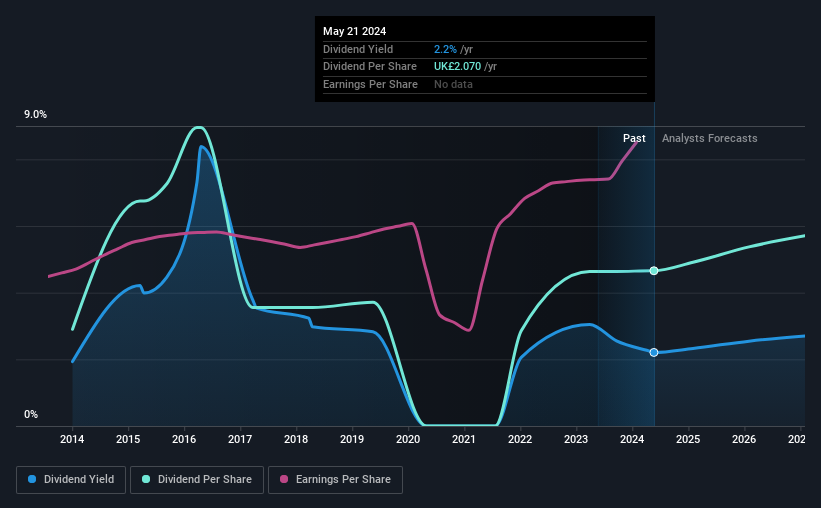NEXT (LON:NXT) Is Paying Out A Larger Dividend Than Last Year
NEXT plc (LON:NXT) will increase its dividend from last year's comparable payment on the 1st of August to £1.41. This makes the dividend yield about the same as the industry average at 2.2%.
See our latest analysis for NEXT
NEXT's Payment Has Solid Earnings Coverage
We like to see a healthy dividend yield, but that is only helpful to us if the payment can continue. However, NEXT's earnings easily cover the dividend. As a result, a large proportion of what it earned was being reinvested back into the business.
Over the next year, EPS is forecast to expand by 4.3%. If the dividend continues on this path, the payout ratio could be 31% by next year, which we think can be pretty sustainable going forward.
Dividend Volatility
While the company has been paying a dividend for a long time, it has cut the dividend at least once in the last 10 years. Since 2014, the dividend has gone from £1.29 total annually to £2.07. This implies that the company grew its distributions at a yearly rate of about 4.8% over that duration. The dividend has seen some fluctuations in the past, so even though the dividend was raised this year, we should remember that it has been cut in the past.
NEXT Could Grow Its Dividend
Growing earnings per share could be a mitigating factor when considering the past fluctuations in the dividend. It's encouraging to see that NEXT has been growing its earnings per share at 8.5% a year over the past five years. With a decent amount of growth and a low payout ratio, we think this bodes well for NEXT's prospects of growing its dividend payments in the future.
We Really Like NEXT's Dividend
Overall, we think this could be an attractive income stock, and it is only getting better by paying a higher dividend this year. Distributions are quite easily covered by earnings, which are also being converted to cash flows. All of these factors considered, we think this has solid potential as a dividend stock.
Companies possessing a stable dividend policy will likely enjoy greater investor interest than those suffering from a more inconsistent approach. Still, investors need to consider a host of other factors, apart from dividend payments, when analysing a company. For example, we've picked out 3 warning signs for NEXT that investors should know about before committing capital to this stock. Looking for more high-yielding dividend ideas? Try our collection of strong dividend payers.
Have feedback on this article? Concerned about the content? Get in touch with us directly. Alternatively, email editorial-team (at) simplywallst.com.
This article by Simply Wall St is general in nature. We provide commentary based on historical data and analyst forecasts only using an unbiased methodology and our articles are not intended to be financial advice. It does not constitute a recommendation to buy or sell any stock, and does not take account of your objectives, or your financial situation. We aim to bring you long-term focused analysis driven by fundamental data. Note that our analysis may not factor in the latest price-sensitive company announcements or qualitative material. Simply Wall St has no position in any stocks mentioned.

 Yahoo Finance
Yahoo Finance 
